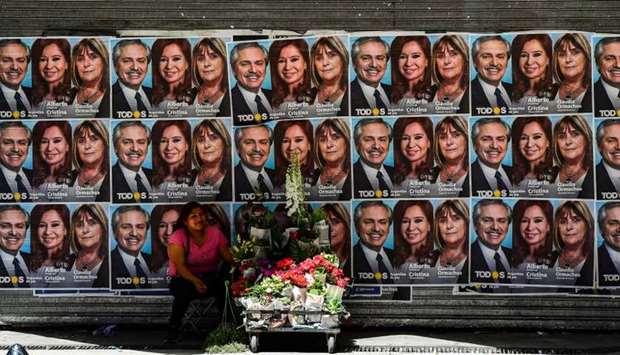Argentinians started voting on Sunday in elections expected to oust one of the most high-profile centre-right governments in the region.
Conservative President Mauricio Macri, 60, is widely expected to lose the vote to centre-left candidate Alberto Fernandez, 60.
Opinion polls gave a lead of about 20 percentage points to Fernandez, who could get more than the 45 per cent of the vote that he needs to win outright without a run-off.
Macri suffered a crushing defeat in the August primaries to Fernandez, who has teamed up with former president Cristina Fernandez de Kirchner (2007-15). The two are not related, despite having the same surname.
Seen by many in the opposition as too divisive a figure, Fernandez de Kirchner, 66, gave up her ambitions for a third presidential term and accepted to run for vice president to Alberto Fernandez, her former chief of staff.
In office since 2015, Macri has headed a moderate, technocratic centre-right government in a region where Jair Bolsonaro's 2018 election victory in Brazil marked a rightward shift and a stronger contrast with leftists such as Bolivia's Evo Morales and Venezuela's embattled Nicolas Maduro.
His government was welcomed by economic liberals opposing the protectionist policies of Cristina Fernandez de Kirchner and her husband and predecessor Nestor Kirchner, who governed from 2003 to 2007 and died in 2010.
Arguing that the growth in public expenditure under the Kirchners was not sustainable, Macri sought to trim Argentina's budget deficit, which stood at more than 5 per cent when he took power.
But the plunge of the peso forced him to seek a huge bailout - 57 billion dollars - from the International Monetary Fund, a deal that was increasingly resented by Argentinians as the austerity policies it imposed hit the middle class.
Macri has overseen a recessive economy; inflation running at more than 50 per cent annually; and an unemployment rate of about 10 per cent, the highest in over a decade.
About 3.4 million Argentinians fell last year below the poverty level, with more than 35 per cent of the population now classified as poor, according to official figures.
Alberto Fernandez's Frente de Todos (Front for All) alliance has sought to present a moderate image in an attempt to unify the opposition and to bring in those fearful of the populism and corruption that characterized the Kirchners' administration.
Macri, meanwhile, wooed potential Fernandez voters by choosing as his running mate Senator Miguel Angel Pichetto, a follower of the Peronist political movement that is named after the late president Juan Peron and that the Fernandez tandem is also associated with.
In addition to a president, Argentinians will also elect 154 members of Congress.

